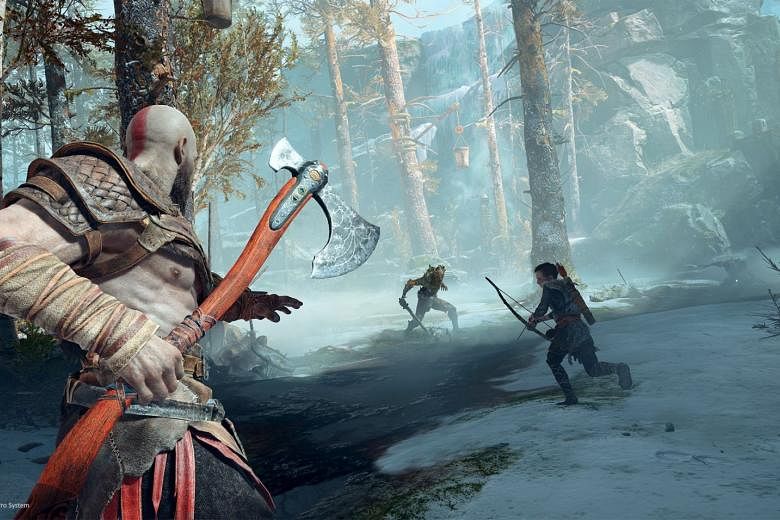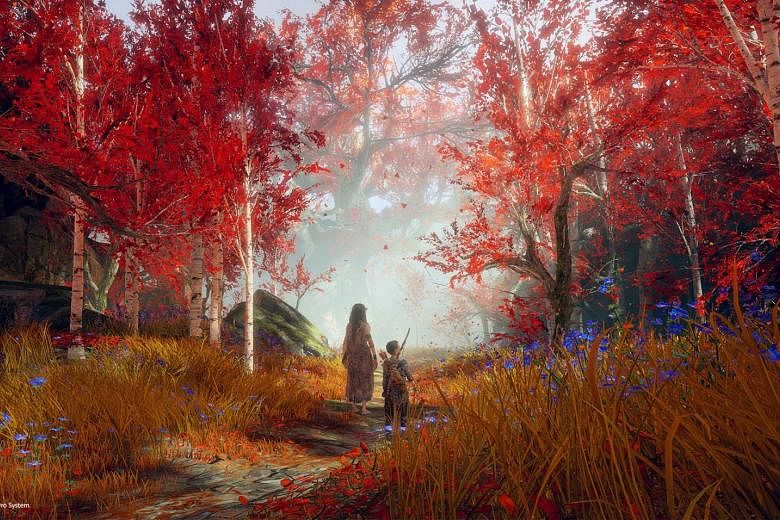Imagine a father-son road trip with a premise like the Oscar-nominated, Ethan Hawke-starring movie Boyhood. But replace Mr Hawke with a computer-generated bald anti-hero, throw in a cast of undead, ogres and trolls, and you get the first major God of War game since 2010.
And what a difference those years make. The game has never looked better, especially on a big television screen with HDR enabled. It is as close as it gets to an interactive God of War movie as fight scenes segue into cutscenes and back seamlessly. This, coupled with the lack of a loading screen, gives it a truly cinematic feel.
Billed as an "reimagining of the series", the new instalment is effectively a reboot of the popular franchise starring the Spartan, Kratos. This time, we are not in Greece anymore. Kratos is now in Midgard, land of the Norse gods. Looking slightly the worse for wear and sporting a beard, Kratos is living like an ordinary mortal, with a wife and a young son, Atreus.
His peace is interrupted by his wife's death, followed shortly by the arrival of a tattooed stranger that feels no pain and proves to be more than a match for Kratos' super-human powers. Thus begins a journey with Atreus to fulfill her final wish - to scatter her ashes from the highest peak of Midgard.
It is a journey fraught with difficulty. Father and son appear ill at ease with each other. Kratos is curt and secretive, preferring to bark orders like a drill sergeant instead of explaining. Atreus, meanwhile, has a snarky streak that shows up in his journal entries that also document the lore and enemies of the land. This icy relationship slowly thaws as both are forced to work together to survive the trip.
I was not quite expecting a story about parenting in a blockbuster video game filled with graphic violence. But it does make sense - the long-time fans who grew up with the series are now adults, likely with their own families. The violent scenes, however, ensure that father-son bonding scenes notwithstanding, it is not a game I would play with my kids around.
For players, Atreus is very handy with his bow. His arrows can stun multiple enemies and whittle down their health. He also spots things that you might have missed, like a key object hanging above you. More importantly, he does not get stuck behind doors or get lost in the forest, so you do not need to babysit him.
Midgard itself appears cold, harsh but beautiful. Most of the game actually takes place around a huge lake dotted with ruins around its shores. It is not an open-world game where you can explore every nook and cranny. While the map is expansive and offers plenty of side quests and optional dungeons, you cannot simply decide to scale that distant peak or wander off the path.
As you progress in the main story, new areas open up in a clever way that shows off the thought behind the world's design. Dungeons are intricate, with knotty puzzles to be solved before giving up their secrets. That locked grill you spied earlier may only be opened much later in the game. For completionists who must acquire every item, this involves a fair amount of backtracking through previously-completed areas. Thankfully, there are no platform-jumping puzzles here, which often stumped me in previous games.
The world is inhabited mostly by hostile enemies. The Norse gods, such as Odin and Thor, are not the sanitised versions in Marvel's Avengers, but are, as depicted in their source material, cruel and vengeful beings. A bickering pair of dwarven brothers provides the comic relief. They also craft and upgrade gear for Kratos and Atreus using materials gathered on the journey.
The combat system has been completely revamped, along with a new over-the-shoulder camera that closely shadows Kratos and the addition of a throwing axe as the main weapon. This axe, which can return to Kratos after being thrown, is crucial to solving many of the game's numerous puzzles. Both Kratos and Atreus can learn new skills that improve their combat abilities, though players can only directly control Kratos.
But it is not a God of War without Kratos' trademark finishing moves that have him brutally ripping enemies apart or smashing them into walls. This, as well as his Spartan Rage ability that turns him into the equivalent of The Incredible Hulk, make a welcome return and should delight long-time fans. But I was pleased that quick-time events that rely on players mashing the correct button at the right moment are scarce compared to previous games. And the ones that I encountered are relatively simple and easy to execute.

-
RATING: 9/10
-
PRICE: $72.90 (PS4 only, version tested)
GENRE: Action role-playing
Besides tackling the main story, the game has a number of optional areas that spice up the gameplay and provide gear upgrades. One such area offers a succession of challenges that players must complete to advance, such as killing a certain number of enemies without getting hit in return. You can return to complete them, as well as other side quests, after finishing the main story.
However, the variety of foes is disappointing - you probably would have seen all the types of enemies after the first few hours. Later encounters feature stronger, slightly altered versions of these base types but with similar move sets that make them predictable.
According to developer Santa Monica Studio, the new game is the first chapter of a story arc set in Midgard. An unexpected twist at the end definitely hints at darker times ahead in future sequels. I can't wait for Kratos and Atreus' next adventure.
Verdict: Kratos is in fine form as the God of War franchise returns with epic fights and cinematic storytelling.




